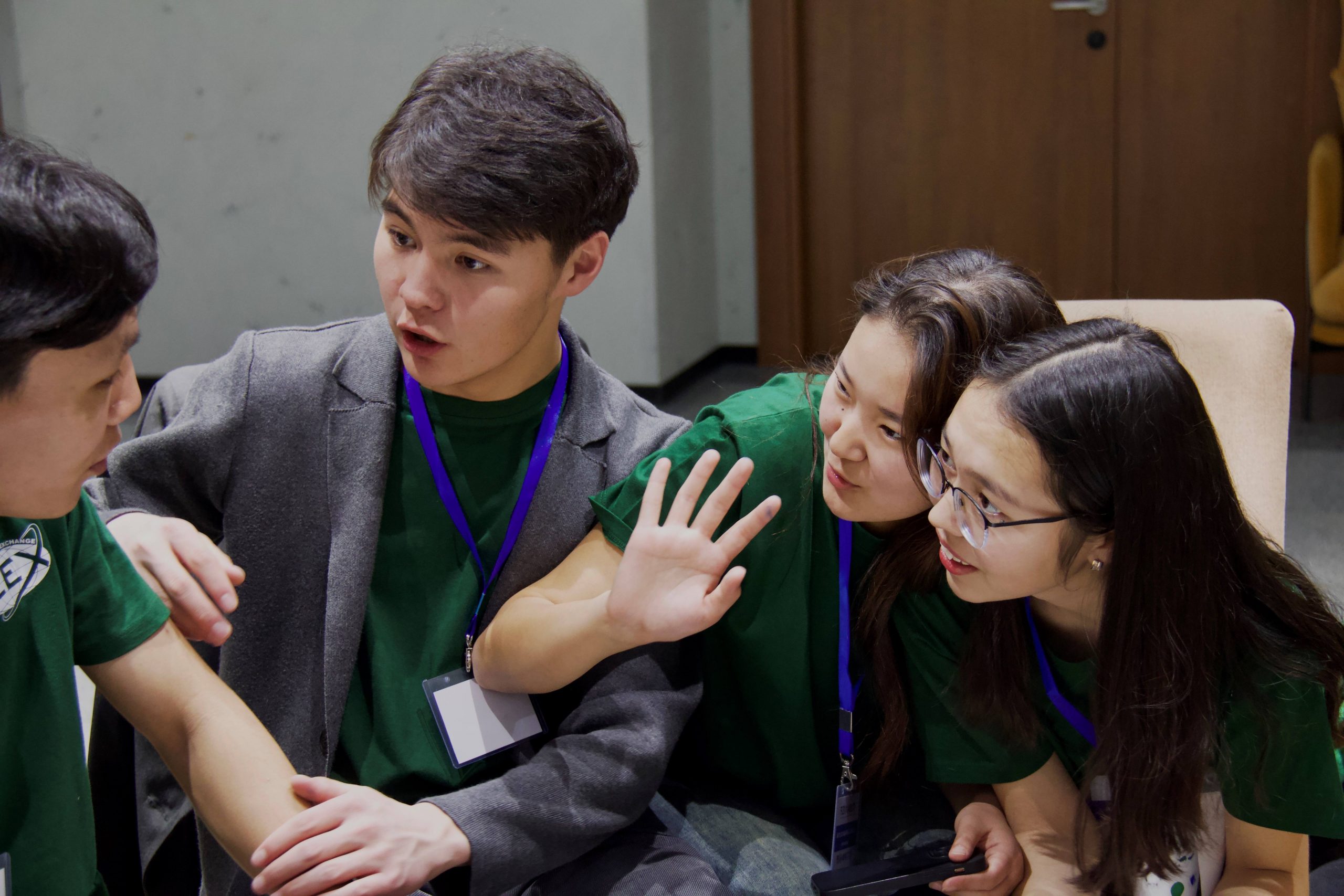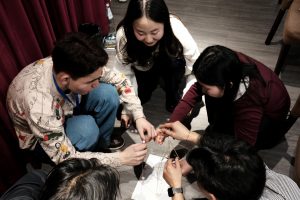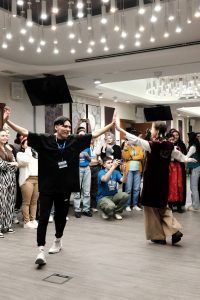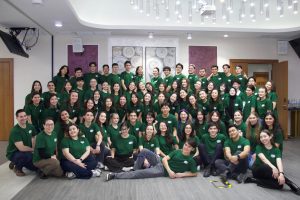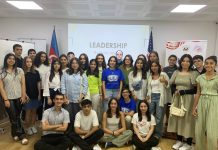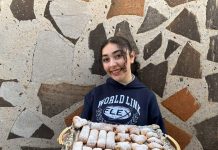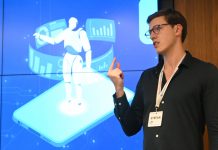By Aknur Berdigulova ’14 (Pearland, TX – Karaganda, Kazakhstan), Senior Program Officer for Secondary School Alumni Programs, American Councils for International Education
The 2024 Central Asia FLEX-Ability Workshop took place in Almaty, Kazakhstan, from February 24-27, bringing together 67 participants and seven trainers and mentors from Kazakhstan, Kyrgyzstan, Mongolia, Tajikistan, Turkmenistan, the United States, and Uzbekistan. This rendition of the annual regional workshop for FLEX alumni focused on communication and mental health. Throughout the four days, participants learned hands-on strategies for professional and personal wellness skills from professional alumni trainers and FLEX alumni mentors. Four special keys turned this workshop into a unique and productive space for professional development, personal growth, and international collaboration.
During the opening ceremony, as the primary organizer of the workshop, I shared a simple fact intended to make participants feel a little wistful: “You only have four days to focus on connecting and being present here and now since you all will not be in the same place at the same time with everyone here ever again. Make the most of it!”
The days of the workshop were scheduled to the minute: participants went from doing energizers to practicing pitches, from drafting effective emails to assessing their well-being, from setting long-term goals to planning small projects, and from being in a large, loud room of over 75 people to being in a smaller group with just a handful of other participants and a mentor. Each workshop day was filled with a week’s worth of emotions, knowledge, and interactions. Some participants focused on their personal lives; others, on their professional lives; but regardless, the workshop was an opportunity for growth for all alumni in both areas.
“During the mental health session, we had an activity where we had to imagine ourselves as a kid, an adult, and an elderly person,” explained Nargyz Bitimbay ’20, Alumni Coordinator for Kazakhstan, reflecting on one of the workshop experiences that had impacted her the most. “In that activity, I reconsidered my values and views and started working on my goals and dreams more determinedly.”
“The workshop helped me realize my priorities and strengths and charged me with immense energy from all the participants and staff to push forward and grow. My life has become more organized and feels not as overwhelming,” reflected City Representative Bekzhan Kasymbekov ’21 from Kyrgyzstan.
“The most useful part for me was being able to have practice sessions right after receiving theoretical knowledge,” Ozodamo Faromuz ’17 from Tajikistan shared. “Each time, even if I had questions after the presentation, the practice time would resolve all of them and help me memorize the information. I use all the tips on better communication in my professional life, and it helped me improve my work relationships and resolve several existing issues.”
The format of the FLEX-Ability workshop is reminiscent of participants’ exchange year with FLEX, as they are placed with international roommates, mixed by generations and home countries in mentor groups, and constantly challenged to talk to new people.
As the lead trainer for the mental health topic, Nominchimeg Davaanyam (Fulbright ’01) had some time to observe the group of participants and take note of the value of international collaboration throughout the workshop: “The diverse cohort of young individuals ignited a profound sense of ‘ikigai’ within me—an amalgamation of passion, joy, and purpose.”
This perception was confirmed by the participants themselves. Khushnud Ochilov ’23, for example, explained that interacting with participants was the most valuable experience for him. “Adapting to this new community was not a challenge for us, especially after learning and performing a dance from a new country on the very first day of the event. I was privileged to perform a Mongolian dance,” Khushnud reflected. “My perspective towards people has changed, as after the program I knew there are people somewhere around the world that could support me, call me their best friend, and perhaps visit me sometime in the future.”
Key #3: Projects
Every regional FLEX and YES alumni workshop has a unique feature in common – a long-lasting impact across the region, as participants all go back home eager to share what they learned or use the skills they developed to make a difference in their respective communities. Participants worked on their post-workshop projects throughout the workshop, thinking ahead to what they identified as needs in their surroundings. And since community needs differ, so do the projects. Aidana Zarlykova ’23 from Kyrgyzstan, for example, is now working with two fellow alumni to organize a project: “Thanks to this workshop, I got a lot of great ideas and coworkers… [W]e are organizing a ‘Boboktime’ project where kids from orphanages will have an opportunity to learn English and self-development skills.”
Meanwhile, Aibiike Kubanychbekova ’23, also from Kyrgyzstan, is working on a project to provide dance classes for children with autism ages ten to 15. The project is called “Dance in Confidence.” “The workshop helped me become more confident in my abilities,” Aibiike shared. “I met so many cool people with whom I aim to cooperate in the future. When you don’t know where to go, you go back to your roots. And for me, it’s FLEX.”
The workshop began with seven strangers – two lead trainers and five mentors – coming together to build and deliver a program that would braid the two distinct topics of communication and mental health into one cohesive program, while also incorporating project development and management sessions, culture-sharing activities, and a celebration of the 30th anniversary of FLEX. They adapted quickly, learned on the go, and taught their hearts out.
What was the result? The result was everything described here and more!
One of the mentors, Sanoat Dodoboeva ’17, brought a unique perspective to this question as a past participant in regional workshops. “As mentors, we had to be a supporting rock for the participants and guide them throughout the process. I believe my mentees each took a valuable skill to implement in their daily lives from all the sessions. I increased my teaching and instruction skills, and I was proud and felt very excited for them to grow their ideas and complete excellent community projects at the end.”
The program had an impact not only on participants, but also on the trainers and mentors themselves. As lead mental health trainer Nominchimeg reflected: “This innovative workshop seamlessly blended enjoyment with education, revealing to me the transformative power of collaborative engagement. Witnessing a diverse array of individuals coming together to effect positive change within their respective communities was truly invigorating.”
Lead trainers:
Xeniya Shilina ‘06 (Taraz, Kazakhstan – Finksburg, MD) – Senior Manager for Internal Change Communication in Global Regions
Nominchimeg Davaanyam Fulbright ’01 (Wichita Falls, TX – Ulaanbaatar, Mongolia) – Master of Education in Educational Psychology and head of NGO providing educational, social and psychological adaptation to vulnerable groups
Mentors:
Madina Sabirova ’11 (Dashoguz, Turkmenistan, placed by American Councils in Camas, WA) – EducationUSA Advisor
Sanoat Dodoboeva ’17 (Istaravshan, Tajikistan, placed by CIEE in Eldora, IA) – Master’s student in Development Cooperation
Vladislava Mostovaya ’17 (Kostanay, Kazakhstan, placed by PAX in Fairbanks, AK) – Middle school English teacher
Arina Turgunbekova ’16 (Bishkek, Kyrgyzstan, placed by American Councils in Joshua, TX) – Programme Assistant at Organization for Security and Co-operation in Europe (OSCE)
Mariia Ermatova ’13 (Bishkek, Kyrgyzstan, placed by PAX in Fort Collins, CO) – HR professional at United Nations Population Fund (UNFPA)
Mentioned Alumni:
Bekzhan Kasymbekov ’21 (Jalal-Abad, Kyrgyzstan, placed by CIEE in Lincoln, NE)
Ozodamo Faromuz ’17 (Dushanbe, Tajikistan, placed by PAX in Lawton, MI)
Nargyz Bitimbay ’20 (Kyzylorda, Kazakhstan, placed by PAX in Palmyra, ME)
Khushnud Ochilov ’23 (Samarkand, Uzbekistan, placed by GCE/HSUSA in Phoenix, AZ)
Aidana Zarlykova ’23 (Karakol, Kyrgyzstan, placed by Greenheart Exchange in Hallowell, ME)
Aibiike Kubanychbekova ’23 (Jalal-Abad, Kyrgyzstan, placed by ASSE in George West, TX)

